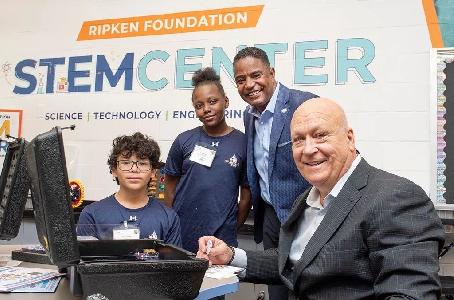Kyle O’Connor has entrepreneurialism in his blood, but above all, it’s his mother, a flight attendant-turned-business owner, who shaped his career.
Born in Maryland, O’Connor is the entrepreneur behind The Startup Nest, a new 25,000-square-foot incubator located in Historic Pigtown in South Baltimore. It’s a neighborhood that hasn’t seen much by way of Baltimore’s tech and innovation scene, until now.
Both of his grandparents started businesses and his parents followed suit. After coming back from World War II, his paternal grandfather opened up laundromats across Brooklyn and his maternal grandfather was one of the founding members of a medical clinic in Dayton, Ohio, which was the first sickle cell anemia research center in the area. In 1989, his mother, Estelle O’Connor opened the first minority- and woman-owned coffee shop in D.C. called Roasters on the Hill. It was the first of its kind to have wholesale grinding in their shop.
“To see my mom build this mini empire and to see the ups and downs that she had to go through really poured into my spirit and my work ethic and my journey as an entrepreneur,” O’Connor said.
We talked to O’Connor about his entrepreneurial journey and why he believes it’s imperative to invest in communities of color.
###
Six different ethnicities comprise his genetic landscape: African American, Irish, Portuguese, Venezuelan, Native American and Jamaican.
“I feel like I’ve always had to prove myself in many different avenues. Coming up at a young age and being a mixed race at a young age, I felt I had to prove myself. Thankfully, I was athletic, because I feel that being in sports helped build my character and my work ethic.”

Kyle O’Connor (far left) and his Startup Nest partners. (Courtesy Photo)
He started his first company, a digital design and development firm called KO Classic Productions in 2006, as a way to combine tech with his creative side. He launched the company with his father, who also has a creative side: he a passion for photography.
“I’ve always gotten a kick from literally taking the drive that I have, the creativeness that I have, applying some of the business methodology that I have, and creating something out of nothing. There have been other people along the way that have assisted in that effort, but that’s how I got into technology.”
After that, his curiosity in technology was piqued. He launched his second business, a mobile payment app called Split that he said was ahead of its time. This was three years before apps like Apple Pay and Google Wallet came onto the market.
“We were trailblazing from a business standpoint and also from a cultural standpoint because at the time you didn’t hear about Blacks in tech and Black founders. We had put three years into this project. We felt that we were ahead of the industry and the industry had to catch up to us, which is why it took so long.”
Three years into running this company, O’Connor and his partners were on the verge of closing a Series A round of funding. An investment firm offered them a substantial sum of money.
“When someone says they have [money] for you, you just jump for joy and reposition your life. So, at that point I had bought a new place, things were looking good. Ultimately, we got a phone call from our attorney saying that we can’t go forward with the investment firm because they were being investigated. Things just imploded at that point. Not from a team standpoint, but from a morale standpoint. It was a humbling feeling because for the next six months, it was just dark.”

The Startup Nest. (Courtesy photo)
Fortunately for him, it was during this six-month period that the foundation of The Startup Nest was born. O’Connor and his partners, his partners Deonn Henderson and Marcus Howard, began strategizing ways they could effectively help develop future business leaders in Baltimore — ones that looked like them, ones with grandiose ideas. His experience with Split informed his Startup Nest plans.
“We were literally trailblazing in a new industry, and I just think about how many people are out here, especially in Baltimore, grinding and believing so passionately that you’re willing to give up just about everything to make this thing come to fruition. When things hit the fan, it’s just rough. I don’t want anyone to ever experience that.”
As the tech scene in Baltimore matures, and organizations seek to support underrepresented people in this industry, conversations about inclusiveness remain a hot topic. From O’Connor’s economic standpoint, he insists on investing in communities like South Baltimore.
“If we don’t start to invest in places like West Baltimore, South Baltimore — wherever the ideas, passion and needs are — if we don’t equally spread this across, we are going to see some challenges. That’s the conversation that I hope is constantly brought up. If we don’t do these things as a whole, we’re all going to feel it. We all need to get on board. We need to start investing in everybody regardless of race, religion and creed. If we don’t, this country and our communities are going to hit a massive brick wall, if we don’t start changing things now.”
Join the conversation!
Find news, events, jobs and people who share your interests on Technical.ly's open community Slack

Baltimore daily roundup: Medtech made in Baltimore; Sen. Sanders visits Morgan State; Humane Ai review debate

Baltimore daily roundup: The city's new esports lab; a conference in Wilmington; GBC reports $4B of economic activity

Baltimore daily roundup: Find your next coworking space; sea turtle legislation; Dali raided and sued

